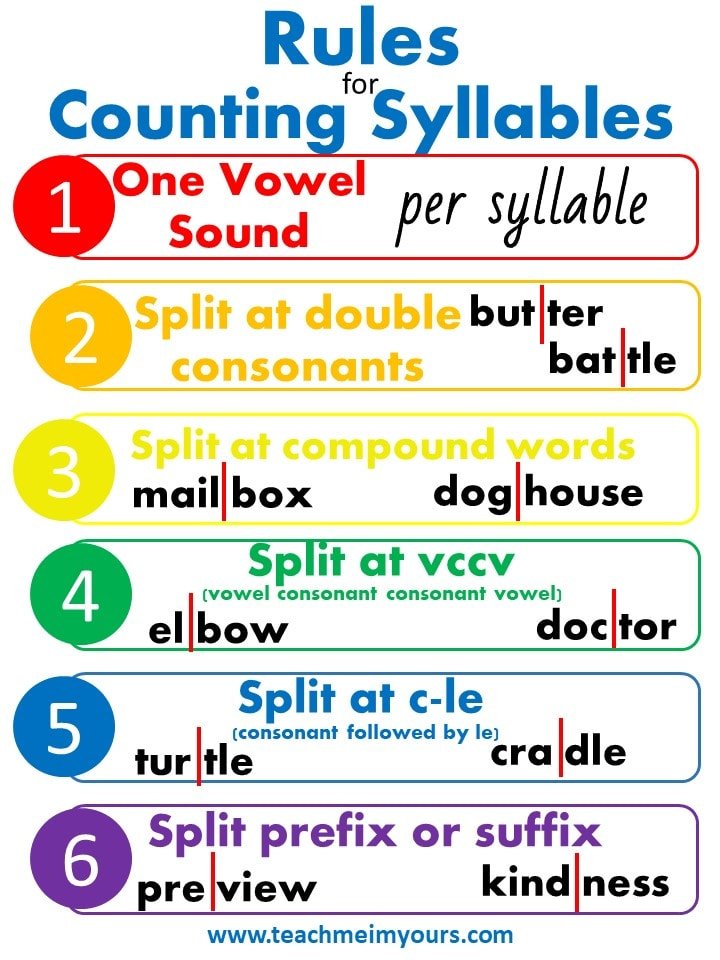Word Attack: Syllable Division Rules
General Word Knowledge Strategies
Eagle Eye reminds a reader to look at the pictures or illustrations.
Lips the Fish reminds a reader to use their mouth muscles and get ready to say the word aloud.
Skippy the Frog reminds a reader to skip the word, continue to read the next sentence or two, then go back to re-read.
Tryin’ Lion reminds a reader try again and re-read.
Meaning Bird reminds the reader to ask themselves if what they read makes sense.
Helpful Kangaroo reminds a reader to ask for help if they have tried some of the above strategies.
Specific Work Attack Strategies
Each of the following Word Attack Strategies have a separate blog with step-by-step instructions.
Chunky Monkey reminds a reader to break the word into smaller pieces or chunking.
Flippy the Dolphin reminds a reader to flip the vowel sound from long to short or short to long.
Sliding Seal reminds a reader to cover the word, then slowly slide hand from left to right.
Spot ‘n Dot reminds a reader to Spot ‘n Dot vowels. This assists with finding syllables. See Syllable Division Rules for helpful tips.
Stretchy Snake reminds a reader to stretch out a word.
Word Attack: Syllable Division Rules
For Decoding through Expert Readers
GOAL: To break a word into syllables then put back together.
Materials:
Index cards; 5x7 will offer a bit more room than 3x5
Word Box OR Ring
if using a Ring, punch a hole in upper corner or center of card
Select words that represent each Syllable Division Rule. These may come from:
Coxhead Academic Words
Reading Vocabulary
Word Lists
A pdf form for Syllable Division is available - just click on the above image.
Syllable Division Rules
Every syllable contains only ONE vowel sound; vowels = a, e, i, o, u, and sometimes y. This includes:
R-controlled vowels stay together;
ar, er, ir, or, ur
Vowel teams stay together;
ai, ay, ea, ee, ei, ie, etc.
Split double consonants
muf / fin
pup / pet
Split compound words:
sun / shine
snow / flake
Split VCCV (vowel-consonant-consonant-vowel)
el / bow
doc / tor
Split C-le (consonant followed by -le)
cra / dle
tur / tle
Split affixes (prefixes & suffixes)
kind / ness
pre / view
Helpful Hints:
Open Syllable = break after a vowel = Long Vowel sound: ti / ger
Closed Syllable = break after a vowel+consonant = Short Vowel sound: in / sect
Digraphs (ch, sh, th, wh, ck, etc.) AND Blends (bl, br, dr, spl, spr, etc.) stay together;
If “ng” or “nk” appears between two vowels with another consonant, treat “ng” or “nk” as one consonant: trink / et
Word Attack Activity:
Select 3 to 5 words from each category
Look for affixes (prefixes & suffixes) and “chunk” together:
PREFIX: re / read
SUFFIX: sing / ing
Look for beginning blends or digraphs and “chunk” together:
BLEND: str / ipe
DIGRAPH: sh / ip
Look for double consonants in the middle of the word and split to “chunk”:
DOUBLE CONSONANTS: rab / bit pump / kin
Look for Greek or Latin roots:
GREEK ROOT: photo / graph
LATIN ROOT: audi / ence
Look for a word within the larger word and “chunk”:
WORD WITHIN a WORD: be / come


